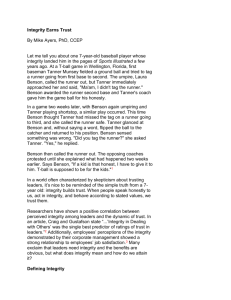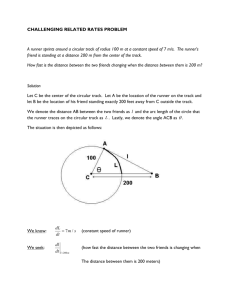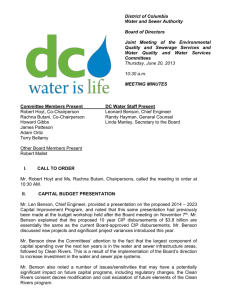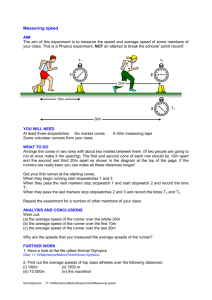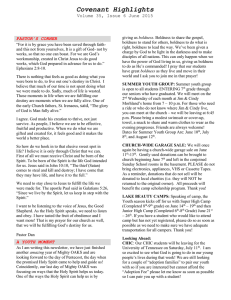Integrity Earns Trust - College of Biblical Studies
advertisement
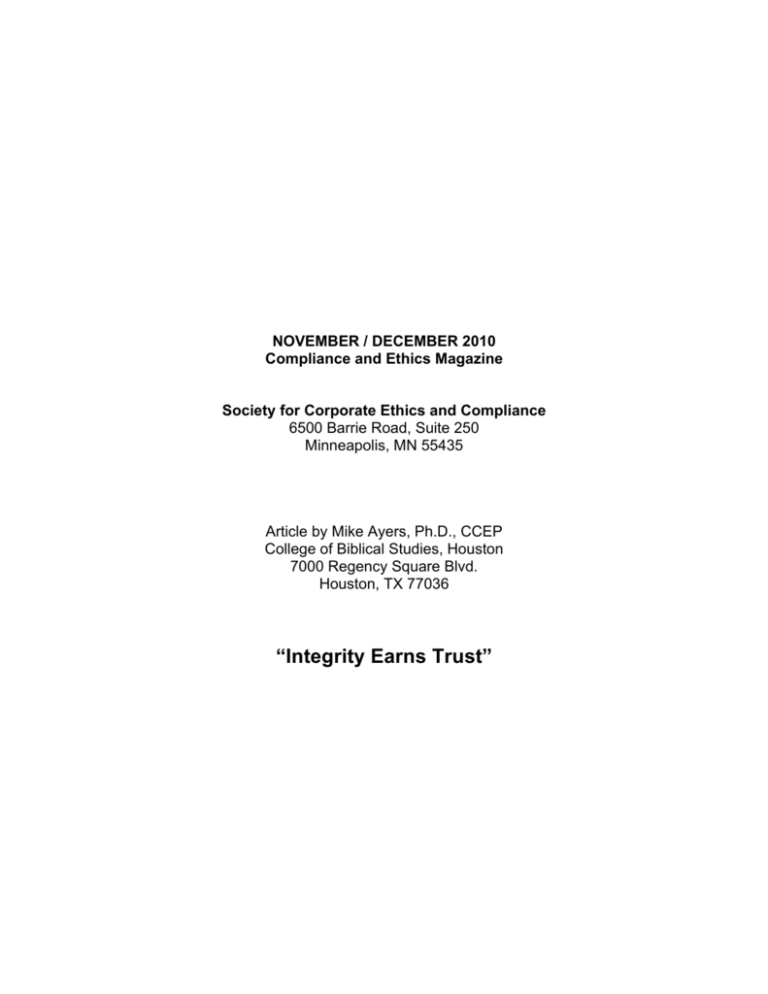
NOVEMBER / DECEMBER 2010 Compliance and Ethics Magazine Society for Corporate Ethics and Compliance 6500 Barrie Road, Suite 250 Minneapolis, MN 55435 Article by Mike Ayers, Ph.D., CCEP College of Biblical Studies, Houston 7000 Regency Square Blvd. Houston, TX 77036 “Integrity Earns Trust” Integrity Earns Trust By Mike Ayers, PhD, CCEP Let me tell you about one 7-year-old baseball player whose integrity landed him in the pages of Sports Illustrated a few years ago. At a T-ball game in Wellington, Florida, first baseman Tanner Munsey fielded a ground ball and tried to tag a runner going from first base to second. The umpire, Laura Benson, called the runner out, but Tanner immediately approached her and said, "Ma'am, I didn't tag the runner." Benson awarded the runner second base and Tanner's coach gave him the game ball for his honesty. In a game two weeks later, with Benson again umpiring and Tanner playing shortstop, a similar play occurred. This time Benson thought Tanner had missed the tag on a runner going to third, and she called the runner safe. Tanner glanced at Benson and, without saying a word, flipped the ball to the catcher and returned to his position. Benson sensed something was wrong. "Did you tag the runner?" she asked Tanner. "Yes," he replied. Benson then called the runner out. The opposing coaches protested until she explained what had happened two weeks earlier. Says Benson, "If a kid is that honest, I have to give it to him. T-ball is supposed to be for the kids."1 In a world often characterized by skepticism about trusting leaders, it’s nice to be reminded of the simple truth from a 7-year old: integrity builds trust. When people speak honestly to us, act in integrity, and behave according to stated values, we trust them. Researchers have shown a positive correlation between perceived integrity among leaders and the dynamic of trust. In an article, Craig and Gustafson state “...’Integrity in Dealing with Others’ was the single best predictor of ratings of trust in leaders.”2 Additionally, employees’ perceptions of the integrity demonstrated by their corporate management showed a strong relationship to employees’ job satisfaction.3 Many exclaim that leaders need integrity and the benefits are obvious, but what does integrity mean and how do we attain it? Defining Integrity People often confuse honesty with integrity. There is a subtle difference. Although being honest is certainly part of being a person of integrity, simple honesty does not capture the full concept. Etymologically, integrity means “wholeness” coming from the Latin integritatem. Derivatives of the word include integer (whole numbers) and integrated, where parts are combined into a whole. The ancient concept is found in the Hebrew word “tamim” (ָ)ּמִיםת. In once instance, it refers to a piece of clay that is shaped and molded by a potter. If the clay lacks tamim, it is inconsistent or contains a flaw. When the clay is fired in the oven, it hardens in the shape of a pot, but when pressure is brought to bear upon it (as when filled with water), the inconsistent vessel breaks under stress. One definition of integrity in the context of leadership is “the extent to which a trustee is believed to adhere to sound moral and ethical principles...”4 Since integrity is wholeness, there are three components of our lives that should remain consistent in relationship to each other: our words, actions, and values. When what we say, what we do, and what we value is congruent, we possess integrity. Consequently, there are three basic forms that a lack of integrity may take. Verbal inconsistency In this case, the person acts according to his true values though his words present a different picture. The lack of integrity in this case takes the form of a basic dishonesty. This is when someone says one thing, but knows and believes another, and acts in a way inconsistent with their words. Simply put, they are intentionally lying. Dishonest words that are inconsistent with what we believe (values) and with what we do (actions) make us people who lack integrity. Action inconsistency A second lack of integrity is an inconsistency between one’s actions on one side, and one’s words and values on the other. In this case, a person presents his or her values through their words, but then acts in an entirely different way. This could reveal a great divergence between one’s “proclaimed” values and “practiced” values. But, it could also be that he or she simply did not have the courage or discipline to act according to their values. This is often the kind of a lack of integrity that is characterized by sincerity, yet still destroys trust. For example, a father may sincerely value his family and therefore state to his son, “I’ll be at your soccer game.” However, when he doesn’t show up at the game, he obviously disappoints his son. If the father does not show up consistently after telling his son timeand-again his intentions to be present, he destroys his son’s trust. Even though he may be sincere in his desire and words, his lack of action and follow through is a lack of integrity, and his son even doubts his father’s sincerity about valuing that relationship. Therefore, to have integrity we must be more than sincere. We must actually follow though on what we say and value. Personal inconsistency The third form expressing a lack of integrity is called a personal inconsistency. This could be characterized as the “political syndrome.” In this case, a person has a particular set of values. However, in an effort to be liked, to advance, or to be elected, he says what others want to hear and does what others want him to do. These insecure motivations cause people to speak and act contrary to their personally held values. In most cases, the motivation is to be accepted, to be promoted or liked, to keep a job, to get one’s way, or other similar motivations. This kind of a lack of integrity is personal in the sense that it is often private. Others may never find out about it, because on the outside, we look and play the part needed to gain approval. Yet, when we violate our most deeply held values, we often innately know it to be true; and this fact creates a sense of personal regret within and possibly even disrespect toward ourselves. In light of the ways that leaders lack integrity and the skepticism surrounding it, there are still those who believe in it and seek to express it authentically. They’ve found the true value of this concept, both for themselves personally and for their organization. A few years ago, a car mechanic was asked to search for the cause of irregular noises in my car. We couldn’t figure out what the periodic, dull knocking sound was that was coming from the back of the vehicle. The mechanic inspected it thoroughly and even drove the car around a bit. He then came to me and said, “There are a lot of things that could be the cause of this, but the truth is, I just don’t know. I don’t think it’s serious because we’ve looked at everything. I suggest you wait until you hear it again and then bring it immediately to us. That will save you some time and money.” Well, this gained trust with me, and the next time the car needed something, I took it back to him. Over the years he’s told the truth about what was needed and what wasn’t. Sometimes saying “You don’t need to really spend your money on this. It will be fine for now.” Knowing that he would tell me the truth, even when it wasn’t beneficial to him, earned my trust. He has a sign at his shop that says, “We value the customer and will do our best to save them time and money.” I’ve taken our family vehicles to him for many years now, and have always had confidence that I am making the right decision. Integrity then is a sort of “first principle” for leaders. Much can be done after integrity; little of lasting value can be accomplished without it. Despite the mass of confusing data and all the research done, the most proven fact is that effective leadership depends upon integrity- the leader’s character as perceived by followers.5 Although leaders who are competent and gifted will always be in demand, leaders who seek personal character and integrity will be followed and respected. They will possess a moral framework by which to make good, ethical decisions. Additionally, they will gain that most valued gift from those they seek to influence and impact: trust. Editor’s note: Mike Ayers is the Director of the Center for Leader Development in Houston, Texas. The CLD provides character and ethics training for employees, managers and leaders. He may be contacted by e-­‐mail at mike.ayers@cldhouston.org or by phone at 713/532-­‐3377. 1 “Scorecard.” Sports Illustrated. Edited by Craig Neff. Accessed 11 October 2010 at http://sportsillustrated.cnn.com/vault/article/magazine/MAG1068563/3/in dex.htm 2 Craig, S. Batholomew and Gustafson, Sigrid B: “Perceived Leader Integrity Scale: An Instrument For Assessing Employee Perceptions Of Leader Integrity.” Leadership Quarterly, 9(2), 127-145. 3 Vitell, SJ & Davis, DL: The relationship between ethics and job satisfaction: An empirical investigation. Journal of Business Ethics, 1990, vol 9, pp 489-494. 4 Colquitt, Jason A; Scott, Brent A; and LePine, Jeffery A: “Trust, Trustworthiness, and Trust Propensity: A Meta-Analytic Test of Their Unique Relationships With Risk Taking and Job Performance.” University of Florida, Journal of Applied Psychology, 2007, vol. 92, No. 4, 909–927 by the American Psychological Association. 5 Kouzes, James M. and Posner, Barry Z: Credibility: How Leaders Gain and Lose It, Why People Demand It. San Francisco, CA: Jossey-Bass Publishers, 1993.
